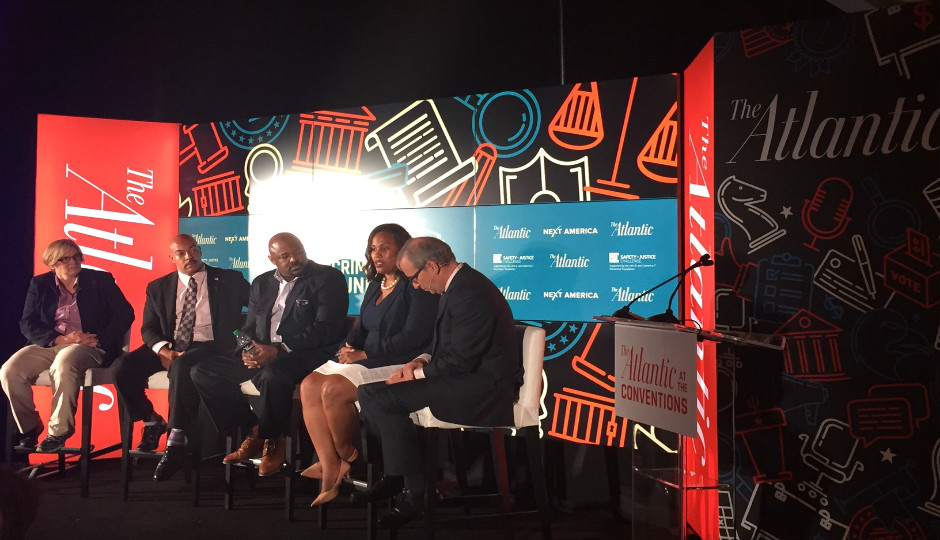The Really Important Criminal Justice Conversation You Missed

The Atlantic panel on criminal justice reform included (left to right) Rutgers professor Anne Morrison Piehl, District Attorney Seth Williams, Redeemed founder William Cobb, Keir Bradford-Grey of the Defender Association of Philadelphia, and moderator Ron Brownstein.
The one discussion this week that will probably impact Philadelphia the most in the not-too-distant future took place in a bar on Tuesday afternoon.
Mayor Jim Kenney and District Attorney Seth Williams were among a handful of city officials who participated in “Rethinking Crime and Punishment: A Next America Forum,” hosted by the Atlantic in the Field House, that spot you absentmindedly walk past all the time on Filbert Street across from Reading Terminal Market.
The primary topic was the city’s sky-high incarceration rate, which is the highest among the 10 largest cities in the country. An ambitious plan to reduce the local prison population by 34 percent over the next three years—from a total of 8,080 in 2015—landed the city a $3.5 million MacArthur Foundation grant earlier this year.
Atlantic senior editor Ron Brownstein asked Kenney why Philly’s prison population grew 45 percent between 1999 and 2008, while other big cities saw their totals fall significantly. “Because the poverty rate is so high,” Kenney said. “If you fix the education and poverty situation, your jail population will go down.”
He framed part of the possible solution as a matter of financial priorities: Is it better to spend $40,000 a year to keep an inmate behind bars in a local prison, or to provide pre-K for every kid in the city, a cost Kenney pegged at $7,000 to $9,000 a year? (Previous estimates put the actual per-student cost at $13,000, which is still a hell of a lot less than what’s spent on inmates.)
Philly residents have, of course, heard Kenney pitch the wonders of expanding pre-K before. But he also noted the role the cash bail system played in driving the population tally up; few offenders—or their families—can afford to post bail. He also made other comments during the forum that might raise some eyebrows, particularly among cops. Brownstein brought up Frank Rizzo, the late mayor and police commissioner whose heavy-handed tactics still loom large in the minds of Philadelphians. “We’re still digging out from that,” Kenney said of Rizzo’s reign, to pockets of laughter. He recalled recoiling in horror when a South Philly woman told him to “be the next Frank Rizzo” when he won the Democratic mayoral nomination last year.
He also referenced his successful push as a Councilman to decriminalize possessing small amounts of marijuana. “We’re locking these guys up for selling drugs on the street corner. The largest drug dealers in the world are the pharmaceutical companies,” he said. (That line, in particular, immediately caught the attention of cops on social media.)
https://twitter.com/Mike_Cerm/status/758046213400825857
Kenney shared the stage with John Wetzel, Pennsylvania’s secretary of corrections, who underscored the need for better education and more services for the mentally ill and those battling addictions. Fifty percent of those who enter the state prison system don’t have a high school diploma, Wetzel said, while 70 percent have a substance abuse problem, and 27 percent have mental health issues. “We need to make better decisions that speak to the humanity of the people who are incarcerated,” he said.
The state has already launched a Justice Reinvestment Initiative that is aimed at having a raft of new reforms ready by 2017. Wetzel said the recommended reforms will be data-driven. “Four decades of bad justice policy has gotten us a bloated system with no return on investment,” he said. He questioned the wisdom of continuing to throw billions across the state to maintain flawed approaches to crime and incarceration.
“People in Harrisburg don’t want to fund education, but they would build a jail in a second,” Kenney said. “There are counties in Pennsylvania [where] their entire industry is based on incarceration. There’s something wrong with that.”
Williams echoed Kenney’s calls for better education funding and better services for drug addicts when he took the stage along with Keir Bradford-Grey, the chief defender of the Defender Association of Philadelphia; William Cobb, the founder of Redeemed, an organization that fights discrimination against ex-offenders; and Anne Morrison Piehl, a professor from the Department of Economics from Rutgers University.
Brownstein asked Williams how Philly ended up with the highest incarceration rate among the 40 largest counties in the country. In the past, Williams said, any questions about violent crime were answered by prosecutors with pushes for longer sentences and more jails. “But if you send someone to state prison, they come back with a PhD in thuggery,” he said.
He pointed to the “Choice Is Yours” diversionary program that his office offers to first-time nonviolent felony drug offenders, who can have their records expunged if they agree to receive education and job training, as beneficial way to drive down the prison population. The program costs about $4,000 per offender, and has a recidivism rate of 8 percent—compared to 63 percent for those who end up in state prison, according to Williams.
The D.A. also said he was interested in having daily reporting centers as an alternative for some offenders who would otherwise have to sit behind bars until they’d have their day in court. Bradford-Grey offered to shake on it; whether the idea ends getting further explored remains to be seen.
Follow @dgambacorta on Twitter.